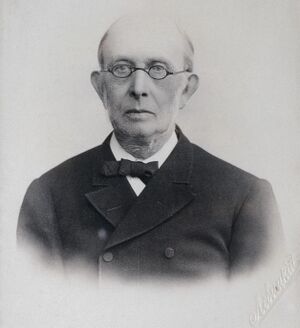Konstantin Pobedonostsev
Russian jurist and politician (b. 18/30 November 1827 [1] in Moscow; d. 10/23 March 1907 in Saint Petersburg), born Konstantin Petrovich Pobedonostsev (Константин Петрович Победоносцев).
After graduating from the Imperial School of Jurisprudence in Saint Petersburg, he began a career in the legal department of the state senate in Moscow. He gave lectures in civil law at Moscow University (1859–1867), and taught at Moscow University (1860–1865), where he was appointed professor of law. In 1865, he became tutor to the sons of Tsar Alexander II of Russia.
His political career began in 1868, when he was elected a senator in Saint Petersburg. In 1874 he was appointed to the State Council, and from 1880 to 1905 he was the Chief Procurator of the Holy Synod of the Russian Orthodox Church. When his former protégé Grand Duke Aleksandr Aleksandrovich acceded the Russian throne in 1881 as Alexander III, Pobedonostsev became one of his closest advisers, and was notoriously conservative in his views.
Throughout the 1870s, Pobedonostsev had been in contact with Fyodor Dostoyevsky, whose religious and nationalist ideas he considered of value to the aims of the Tsarist government as it tried to quell the ever-increasing tide of revolutionary unrest. Dostoyevsky discussed with him some aspects of The Brothers Karamazov as he worked on it in 1879, but, despite sharing the senator's concern with exposing the balefulness of contemporary 'nihilism', it is believed that Pobedonostsev was to some extent the prototype of the ominous Grand Inquisitor in that novel. Some years later Lev Tolstoy, in his novel Resurrection (1899), would give a scathing portrait of Pobedonostsev in the hypocritical and repulsive figure of Toporov.
On 19/31 May 1881, Tchaikovsky wrote to Pobedonostsev (whom he had first met in the summer of 1867), asking him to petition Alexander III on his behalf for a one-off grant of 3,000 silver rubles. This request was granted, and the composer wrote again to thank Pobedonostsev on 7/19 June 1881 [2]. It is very likely that Pobedonostsev had a hand in the Tsar's decision to award Tchaikovsky a lifetime annuity of 3,000 rubles in 1888. This would by no means have been the only such instance of Pobedonostsev supporting worthy causes: he also provided generous assistance to the educator Sergey Rachinsky.
Correspondence with Tchaikovsky
5 letters from Tchaikovsky to Konstantin Pobedonostsev have survived, dating from 1881 to 1886, all of which have been translated into English on this website:
- Letter 1759 – 19/31 May 1881, from Kamenka
- Letter 1770 – 1/13 June 1881, from Kamenka
- Letter 1772 – 4/16 June 1881, from Kamenka
- Letter 1781 – 7/19 June 1881, from Kamenka
- Letter 2899 – 26 February/10 March 1886, from Maydanovo
5 letters from Pobedonostsev to Tchaikovsky, dating from 1881 to 1884, are preserved in the Tchaikovsky State Memorial Musical Museum-Reserve at Klin (a4, Nos. 3618–3622).
Bibliography
- Синодалиное училище церковного пения в его прошлом и настоящем (1911)
- К. П. Победоносцев и его корреспонденты. Письма и записки, том 1, полутом 1 (1923)
External Links
Notes and References
- ↑ Most older sources give his birthdate as 21 May 1827 [O.S.], but the correct date has more recently been established. See N. D. Shilov, Когда родился Константин Петрович Победоносцев? (2014) [1].
- ↑ See Letter 1781 to Konstantin Pobedonostsev , 7/19 June 1881.

